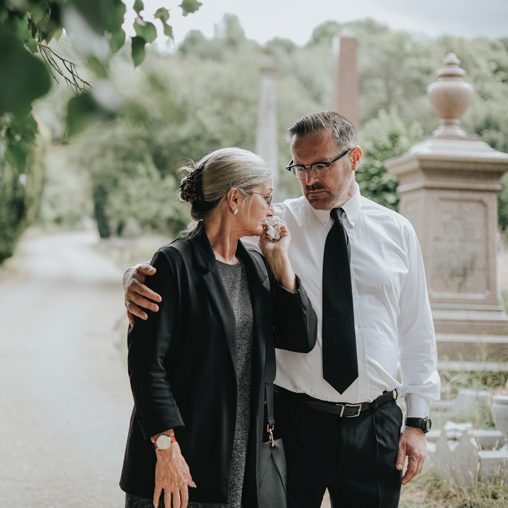
Making Beauty from Ashes
When we see our kids headed in the wrong direction, we want to help turn them around. But ultimately, it's our child's choice. Author Craig Svensson talks to the Wilsons about his son's ongoing battle with drug addiction. While Craig and his wife tried every avenue possible to find him help, Eric continued to use. After fifteen years on and off the streets, and in and out of hospitals, Svensson tells how Eric lost his battle with addiction in January 2017, dying sick and alone at the age of thirty.
Show Notes
About the Host
About the Guest
-
- Find resources from this podcast at https://shop.familylife.com/Products.aspx?categoryid=130.
- Download FamilyLife's new app! https://www.familylife.com/app/
- Check out all that's available on the FamilyLife Podcast Network. https://www.familylife.com/familylife-podcast-network/
- Have the FamilyLife Today® podcast and resources helped you? Consider becoming a Legacy Partner, a monthly supporter of FamilyLife. https://www.familylife.com/legacy
-
Dave and Ann Wilson
Dave and Ann Wilson are hosts of FamilyLife Today®, FamilyLife’s nationally-syndicated radio program. Dave and Ann have been married for more than 38 years and have spent the last 33 teaching and mentoring couples and parents across the country. They have been featured speakers at FamilyLife’s Weekend to Remember® marriage getaway since 1993 and have also hosted their own marriage conferences across the country. Cofounders of Kensington Church—a national, multicampus church that hosts more than 14,000 visitors every weekend—the Wilsons are the creative force behind DVD teaching series Rock Your Marriage and The Survival Guide To Parenting, as well as authors of the recently released book Vertical Marriage (Zondervan, 2019). Dave is a graduate of the International School of Theology, where he received a Master of Divinity degree. A Ball State University Hall of Fame quarterback, Dave served the Detroit Lions as chaplain for 33 years. Ann attended the University of Kentucky. She has been active alongside Dave in ministry as a speaker, writer, small-group leader, and mentor to countless wives of professional athletes. The Wilsons live in the Detroit area. They have three grown sons, CJ, Austin, and Cody, three daughters-in-law, and a growing number of grandchildren.
-

Craig Svensson
Dr. Craig K. Svensson is Dean Emeritus of Pharmacy and Professor of Medicinal Chemistry & Molecular Pharmacology at Purdue University, as well as Adjunct Professor of Pharmacology & Toxicology at the Indiana University School of Medicine. He has served as a Bible Teacher, interim preacher, a seminary board chair, a mission agency board chair, small group leader, and as a visiting seminary lecturer. He and his wife of thirty-six years live in West Lafayette, IN, where they serve with Fait...more
Craig Svensson talks to the Wilsons about his son’s ongoing battle with drug addiction. While Craig and his wife tried every avenue possible to find him help, Eric continued to use.
Bob: Yes.
Craig: At the end of his 15-year journey, he died tragically on January 18 of 2017. That was the most crushing blow we could have experienced. He was living on his own; he was back in Indiana at that time; he wasn’t living too far from our home.
I actually learned [of his death] by a member from the county coroner’s office, coming to my office at the university, and showing me pictures of a body they found that they thought was our son. That was the hardest moment of my life, and then rushed from there to go tell my wife; I certainly didn’t want her to hear from someone else. It was a crushing blow, because we knew our prodigal son would never come home.
Bob: He died of an overdose?
Craig: He did not. He ended up dying of sepsis/of a blood infection. Because of his drug use, he had been in an accident that required multiple surgeries. It really tore up his knee. He ended up with an infected knee, and they just could not clear it; he ended up with an infection.
When they told us they found him, we thought for sure it probably was an overdose. He had just been resuscitated from an overdose just a month before. Many times, he had been resuscitated from drug overdoses—never were they enough to turn him from his drug-using ways—but in the end, it was a blood infection that took his life.
Bob: When was the last time you talked with him?
Craig: It was his birthday; we took him out for a meal for his birthday. We had texted after that, but—
Bob: This is how long before—
Craig: So a month before his death.
Dave: So he was 30?
Craig: He was 30.
Bob: What was that birthday dinner like?
Craig: You know, it was a cordial dinner; but you know, when your child is out of your home, and they are living a destructive lifestyle, it’s: “What do you talk about? What do you talk about that’s not going to create conflict?” “How do you show love? How do you communicate love?” when you know there is a huge barrier there because of the choices that he is making. He knows it, and you know it; but it was a cordial/a friendly dinner.
There was never a time that our son parted from us that he didn’t say, “Love you, Pops!” He always called me “Pops.” We did not have the kind of relationship that we couldn’t talk peacefully. I know there are some, who have prodigals, and they can’t/they just can’t communicate at all.
Bob: When you learn that your son is dead, did you begin to revisit all of that: “What could we have done?” “What should we have done?”—stuff that had come up earlier; or were you at peace with the choices you’d made, as parents?
Craig: Certainly, there is some of that. You can’t, when you see a loss of a child—they’ve lost their life because of destructive choices—I can’t imagine that you wouldn’t sit back and say, “Could we have done something different? Did we miss something?”
I’ll tell you, though, one of the gifts that my son gave me that, perhaps, helped in that time—he said it once verbally, and then the very last Father’s Day note that he gave me—the last Father’s Day that he was alive—he just wrote it on a small torn-out piece of notebook paper/just “Happy Father’s Day, Dad.” He said, “I know I’ve made a lot of choices that have hurt you, and that you disagree with; and I know I haven’t gone the path that you wanted me to go. But I know that you love me, and you’ll always be there for me. The choices I’ve made I’ve made because I wanted to, and I want you to know it’s not your fault.”
Ann: Oh!
Craig: I came across that note just a couple weeks ago as I was cleaning some stuff out in my dresser. It was a gift from him to say that—to know that he didn’t feel that his choices were a failure on our part. Now, God will be the judge as to how well we’ve done as parents; but I know that he didn’t live with a sense of: “My parents mistreated me. My parents really messed up with me, and all that’s happened is my parents’ fault.” That, in some sense, was a gift that gave me a certain peace.
Bob: Do you have any sense that, maybe, in a quiet moment, there was a profession that never manifested itself in the fruit of repentance that we’d all like to see?
Craig: Of course, we can’t speak for his final hours. We weren’t there; only God knows. What we do know is that our prayers that our prodigal would come home never happened, and that was hard to live with; you know? That may be one the hardest moments for me—was that next morning, when I go on my knees and began my day in prayer—and I always pray for each of our children. Now, I’m struck with the reality that there was one for whom I could no longer pray and that my most earnest prayer hadn’t been answered.
Ann: Oh!
Craig: How do you regain confidence in prayer when a petition you’ve made for
30 years has been met with the silence of heaven?
Dave: Oh, how do you?
Craig: For me, it was spending time in the Garden of Gethsemane with Jesus and at the cross. In the garden, Jesus prayed the most earnest prayer; He pled to the Father, “Let this cup pass from Me.” His earnestness was so intense that He sweat great drops of blood. Then the next day, He’s hanging on the cross; and the wrath of God is coming upon Him. Yet, what did Jesus do?
He later prayed again, and He prayed the greatest prayer of trust that was ever recorded in the Bible; He says, “Father, into Your hands, I commit My spirit.” In that deepest, darkest moment as He’s about to step into death, He says, “Father, I trust You completely.” If Jesus can do that, I can follow His path; and I can trust the Father for the future. So pray—pray with confidence and pray with earnestness—because the Father can be trusted.
Ann: What about your wife? Did she go through a similar journey in her faith?
Craig: I think yes; I think, for her, probably the longest struggle is being able to experience joy again. One of the things that we faced—that reality that many couples, who lose a child, face—is that we mourn differently, and that’s okay. We had to give each other space to do that and give each other understanding to mourn differently.
Ann: I think there are so many times in grief when we haven’t gotten what we’ve prayed for. I had a sister that died of cancer when she was 45; and you pray for so long, and you never have the prayer answered the way you want. I do remember, after my sister had passed, going before the Father on my knees, saying, “I mad at You. You didn’t answer this the way I had wanted. It doesn’t make sense to me; but I will follow You at this point as an act of obedience, because my heart feels so dead; but I will follow You as an act of my will.”
I think that’s a good first step of just—and maybe, it’s not a first step; maybe, it takes a while to get to that point—but there is a point that I felt like He carried me. I’m sure your wife and you have felt that at times, too, like you’re desperate for Him/for Jesus to heal your own heart.
Craig: He is the only One who can do it; right?
Ann: Yes.
Craig: The great promise in Scripture is that God will not leave us destitute of comfort. Tears may flood us in the night, but joy will come in the morning. God will not leave us. That period of mourning may be different—that period of grief and testing may seem very long—but ultimately, God will come; and He will bring His comfort.
Dave: Is that what you would say to a parent, listening right now, who has got a 15-year-old/14-year-old—back when you first started that journey—what would you say to them?
Craig: I would say two things. One: “Remember that your hope is in God and not your children.” If you build your hope on your children, and how they turn out, if they make wrong choices, the journey is going to be terrifying; if they end tragically, like ours, it’s going to be absolutely devastating. But when you put your hope in God, no matter what happens, you know He’ll see you through it.
The second thing I would say to them is: “Always hold out hope to the prodigal.” You know, obviously, there are different stages people go through. Early on, it’s a little bit different than in the end. When people live a destructive life, and you look and see how messy their life has become, putting it back together seems like I’m [un-scrabbling] an egg. It seems an impossible thing to do, and it will to them as well. We’ve seen that desperate look in people in our homeless community. I mean, their lives are so fractured—every relationship they have—to put it all back together seems impossible.
What you want to do is hold out hope that it can be done in Christ; and that you’ll be there with them, and you’ll help them walk through it. If you can hold anything out to your prodigal, hold out hope; because we’ve all heard the stories of people, who have borne very difficult things—whether it is people in concentration camps or people who live with horrendous illnesses—and what gets them through it?—it is hope.
Bob: The verse that’s been echoing in my own head, as you’ve been talking, is the last verses in the Book of Habakkuk, where it is talking about agricultural stuff—you know, there is no fruit on the vine; there are no blossoms on the fig tree; and the olive plants are failing. That’s not what we’re facing; but it can feel that way when you’ve got a child, who is acting out like there is no fruit on the vine; what we’ve been hoping for and praying for is not coming to pass.
What do you do? Habakkuk says, “Yet, I will rejoice in the Lord.” That’s where I’m going to find joy—not in the circumstances/not of life in a fallen world—“I’m going to rejoice in the Lord; I will take joy in the God of my salvation.” You’ve got to go back there and say, “Lord, restore the joy; because it’s gone. You’re my source of joy; God, the Lord, is my strength.”
I think a lot of parents, who are in difficult situations, you look at the difficult situation/circumstances and you go: “Where do I find hope?” “Where do I find joy?” “Where do I find peace?” Where do I find…”—well, you find it in the Lord; and you go to Him.
Craig: Joy is something you have to decide to fight for every day.
Bob: I am grateful—and I know our listeners are grateful—that you had the courage—
Ann: Yes.
Bob: —it really is courage—and you said, “We’re going to take our pain, and we’re going to comfort others with the comfort with which we’ve been comforted and try to use this redemptive-ly in other people’s lives.” You’ve done that, here, on FamilyLife Today; you’ve done it in your book. Thank you for doing that.
Thank your wife—I know you gave her the manuscript and said, “I won’t share this with anybody until you say so,”—she said, “Yes, we need to share this.” Thank you both.
Craig: Well, praise to God. We just want to see Him bring beauty out of ashes.
Bob: Yes; Craig’s book is called The Painful Path of a Prodigal: Biblical Help and Hope for Those Who Love the Wayward and Rebellious. You can order a copy when you go to FamilyLifeToday.com, or call 1-800-FL-TODAY to get a copy of the book. Again, the book is called The Painful Path of a Prodigal by Craig Svensson. Order, online, at FamilyLifeToday.com; or call 1-800-358-6329—that’s 1-800-“F” as in family, “L” as in life, and then the word, “TODAY.”
You know, what we’ve talked about this week is just a reminder that in a marriage/in a family, there will be some very difficult seasons. All of us will experience them, and we need to be prepared for them.
David Robbins, who is the president of FamilyLife® is here with us today. David, we should not be surprised when we go through seasons in our marriage/in our family when we need to reach out and get help.
David: No doubt, Bob. Navigating a family is guaranteed to be challenging, because we have a bunch people who have a mix of dignity and depravity inside of us. Thank goodness for Jesus, who is redeeming it; but He’s in the process of redeeming it. We need coaching; we need confidence to keep going the next day; and we need people to cheer us on that our labor is not in vain, and that God is working, and continues working in us.
I’m so grateful for an email I received recently that cheered me on about what we do at FamilyLife®. This listener emailed and said, “Thank you for intentionally and authentically sharing the gospel. Jesus is using FamilyLife mightily; and the ripple effect has begun with my family, friends, and my church. Words cannot express how much I appreciate you and your courageous ministry, especially in this chaotic world.”
I just want to thank those of you, who are partners with us and help fuel the ministry of FamilyLife. Our vision is to—certainly, to bring help and hope to people—but to also equip people to be help and hope in their home, and in their communities, and in their church. We are not ashamed of the gospel because it is the power of God that brings salvation. I am so thankful for you, who help equip us to be able to bring the gospel to more people.
Bob: Let me just quickly add that—for those, who can make a donation today to support the work of FamilyLife Today, we’d love to send them, as a thank-you gift, a resource FamilyLife has created called “The Twelve Names of Christmas”™, a collection of twelve Christmas ornaments you can use with your kids or your grandkids, as the Christmas season draws near, to help point them toward the reality of the One whose birth we celebrate at Christmas.
“The Twelve Names of Christmas” is our thank-you gift when you make a donation today to support FamilyLife Today. Go online at FamilyLifeToday.com to donate, or call 1-800-FL-TODAY to make your donation. Thanks, in advance, for whatever you are able to do.
And thank you, David, for joining us.
We hope you have a great weekend. Hope that you and your family are able to worship together with your local church this weekend, and we hope you can join us on Monday when we’re going to spend time with a couple that some of you already know from their online video blog, Harold and Rachel Earls. We’re going to hear about their courtship, about their marriage, about Harold’s adventure climbing Mt. Everest. We’ll get caught up with the Earls on Monday. I hope you can tune in for that.
I want to thank our engineer today, Keith Lynch, along with our entire broadcast production team. On behalf of our hosts, Dave and Ann Wilson, I’m Bob Lepine. Have a great weekend. We will see you back Monday for another edition of FamilyLife Today.
FamilyLife Today is a production of FamilyLife of Little Rock, Arkansas; a Cru® Ministry. Help for today. Hope for tomorrow.
We are so happy to provide these transcripts to you. However, there is a cost to produce them for our website. If you’ve benefited from the broadcast transcripts, would you consider donating today to help defray the costs?
Copyright © 2020 FamilyLife. All rights reserved.
1



